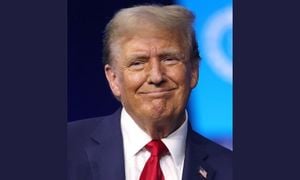France and the broader European economy are facing significant challenges due to the recent decline of the French franc, sparking discussions among financial authorities about monetary policies and the impending need for adjustment.
French authorities have made clear their expectations for the European Central Bank (ECB). François Villeroy de Galhau, Governor of the Bank of France and member of the ECB’s governing council, indicated the possibility of lowering the deposit interest rate to 2% by this upcoming summer. This drop follows the ECB's previous decision to reduce rates recently, which is indicative of wider concerns about economic stagnation. Villeroy remarked, "Given the current situation, we could reach 2% by next summer," as reported by Alternatives Economiques.
Concerns raised about the resilience of the French economy are particularly relevant against the backdrop of tariffs imposed by U.S. President Donald Trump. Villeroy warned these tariffs could negatively affect France's economic growth, especially as they complicate trade relationships. This is reflective of broader worries within Europe about U.S. policies disrupting trade, particularly with the implementation of tariffs on steel, aluminum, and various imported goods.
On January 30, the ECB did cut the deposit interest rate by 25 basis points to 2.75%, with expectations for another reduction as fears about sluggish economic growth overshadow inflation concerns. According to the French National Institute of Statistics and Economic Studies, consumer prices rose 1.8% year-on-year as of January, aligning with analyst forecasts.
Looking forward, Villeroy expressed optimism about France avoiding recession, predicting growth between 0.1% and 0.2% for the first quarter of the year compared to the previous three months. This cautious optimism is balanced by the recognition of structural challenges posed by external factors like tariff policies.
On the political front, President Emmanuel Macron has communicated significant intentions to adapt national priorities to the changing global terrain shaped by the economic crisis. During an online dialogue with social media users, Macron stressed the importance of reassessing financial choices within Europe. He indicated, “We Europeans must increase our defense efforts to respond to the new era upon us.”
Macron's comments were underscored by rising tensions with Russia and the broader geopolitical environment impacting the EU’s economic stability. The president insisted on the legitimacy of Ukraine's aspirations to join the EU and NATO, stating, “No one has the right to tell Ukraine it cannot join the European Union,” as reported by the Agence France-Presse.
The economic discourse has been met with mixed responses from various sectors within France. Critics of Trump's trade policies argue they may hamper economic recovery not just for France but for all of Europe. A potential-factor highlighted by Villeroy is the mutual dependency on trade and the necessity for cohesive European strategies to adapt to external pressures.
Experts believe it is imperative for European banks to consolidate and collaborate more closely. The integration of banking sectors could yield heightened competitive advantages on the global platform. Villeroy emphasized, “Uniting European sectors could make us more competitive,” which is strategic rhetoric aimed at addressing the competitive disadvantage posed by excessive fragmentation within European finance.
Despite initial optimism, the latest decline of the franc is sending tremors through economics discussions, necessitating caution as we move through 2023. Policymakers will need to remain vigilant about the influence of U.S. foreign economic policies and the potential ripple effects throughout the European economy.
While discussing the ramifications of the franc’s decline, it becomes evident analysts will need to work extensively to forecast inflation rates and economic recovery timelines as these variables continue to fluctuate. A comprehensive approach toward rate adjustments and responsive economic strategies might become pivotal for France, particularly if inflation pressures endure or worsen.
Whether the projected interest rate cuts from the ECB will stimulate growth or create new challenges remains to be seen. France—along with its European counterparts—stand at the crossroads, poised between recovery efforts and the looming uncertainty dictated by geopolitical dynamics and the influence of external economic policies. The consequences for French citizens and businesses hinge on these decisions, which may shape the economic narrative for years to come.



